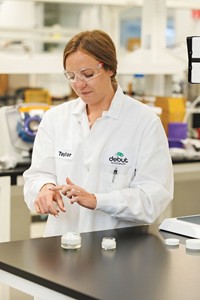Advertisement
Grab your lab coat. Let's get started
Welcome!
Welcome!
Create an account below to get 6 C&EN articles per month, receive newsletters and more - all free.
It seems this is your first time logging in online. Please enter the following information to continue.
As an ACS member you automatically get access to this site. All we need is few more details to create your reading experience.
Not you? Sign in with a different account.
Not you? Sign in with a different account.
ERROR 1
ERROR 1
ERROR 2
ERROR 2
ERROR 2
ERROR 2
ERROR 2
Password and Confirm password must match.
If you have an ACS member number, please enter it here so we can link this account to your membership. (optional)
ERROR 2
ACS values your privacy. By submitting your information, you are gaining access to C&EN and subscribing to our weekly newsletter. We use the information you provide to make your reading experience better, and we will never sell your data to third party members.
Start-ups
Ginkgo raises $290 million, pairs with start-up accelerators for organism engineering
Well-funded Y Combinator grad will offer services to young firms in exchange for equity
by Melody M. Bomgardner
September 19, 2019
| A version of this story appeared in
Volume 97, Issue 37

The synthetic biology firm Ginkgo Bioworks has raised $290 million in a fifth round of funding from investors including T. Rowe Price, Viking Global Investors, and Bill Gates’s Cascade Investment to expand its abilities in organism engineering. The round brings Ginkgo’s total funding to $719 million.
In the last 2 years, Ginkgo has expanded into markets that have proved appealing to its investors. It will produce fermentation-derived cannabinoids with Cronos and is working with Roche to discover new antibiotics. It is developing so-called living medicines for Synlogic. Last year it spun off Motif FoodWorks, which aims to produce dairy proteins using microbes.
Most recently, Ginkgo has partnered with two start-up accelerators, Y Combinator and Petri, to bring its organism-engineering services to early-stage firms for no money down. Instead, Ginkgo will receive equity stakes in companies if it meets their technical milestones.
The deal could appeal to new companies producing chemicals, flavor molecules, cosmetic ingredients, or drugs that require a custom-designed fermentation organism. It’s an opportunity for start-ups, which are generally strapped for cash, to access the same technology Ginkgo is providing to its large, established partners, Y Combinator partner Jared Friedman writes in a blog post.
It’s no coincidence that Ginkgo is pairing with Y Combinator. In 2014, Ginkgo was the first biotech firm backed by the accelerator.
In those days, Ginkgo had to bootstrap to get the equipment it needed, according to Austin Che, a Ginkgo founder. “We got our lab equipment from eBay and MIT dumpsters,” he recalls in a blog post. Ginkgo sees its new service as a way for today’s young firms to lower their costs.






Join the conversation
Contact the reporter
Submit a Letter to the Editor for publication
Engage with us on Twitter